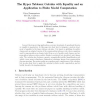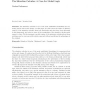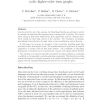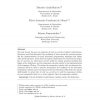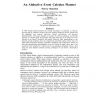102
click to vote
LOGCOM
2010
15 years 29 days ago
2010
In most theorem proving applications, a proper treatment of equational theories or equality is mandatory. In this paper we show how to integrate a modern treatment of equality in ...
106
click to vote
JOLLI
2010
15 years 29 days ago
2010
Abstract The situation calculus is one of the most established formalisms for reasoning about action and change. In this paper we will review the basics of Reiter’s version of th...
133
Voted
MSCS
2007
15 years 2 months ago
2007
Introduced at the end of the nineties, the Rewriting Calculus (ρ-calculus, for short) is a simple calculus that fully integrates term-rewriting and λ-calculus. The rewrite rules...
104
Voted
ENTCS
1998
15 years 2 months ago
1998
We obtain a new formalism for concurrent object-oriented languages by extending Abadi and Cardelli's imperative object calculus with operators for concurrency from the -calc...
168
Voted
ENTCS
2002
15 years 2 months ago
2002
The past decade has seen an explosion of work on calculi of explicit substitutions. Numerous work has illustrated the usefulness of these calculi for practical notions like the im...
115
click to vote
ACTA
1998
15 years 2 months ago
1998
The paper focusses on the logical backgrounds of the Dijkstra-Scholten program development style for correct programs. For proving the correctness of a program (i.e. the fact that...
113
Voted
FAC
2002
15 years 2 months ago
2002
Parallel computers have not yet had the expected impact on mainstream computing. Parallelism adds a level of complexity to the programming task that makes it very error-prone. More...
142
click to vote
ENTCS
2002
15 years 2 months ago
2002
We present a calculus for modelling "environment-aware" computations, that is computations that adapt their behaviour according to the capabilities of the environment. T...
135
click to vote
JSC
2000
15 years 2 months ago
2000
Tarski-Givant's map calculus is briefly reviewed, and a plan of research is outlined aimed at investigating applications of this ground equational formalism in the theorem-pr...
128
click to vote
JLP
2000
15 years 2 months ago
2000
In 1969 Cordell Green presented his seminal description of planning as theorem proving with the situation calculus. The most pleasing feature of Green's account was the negli...
